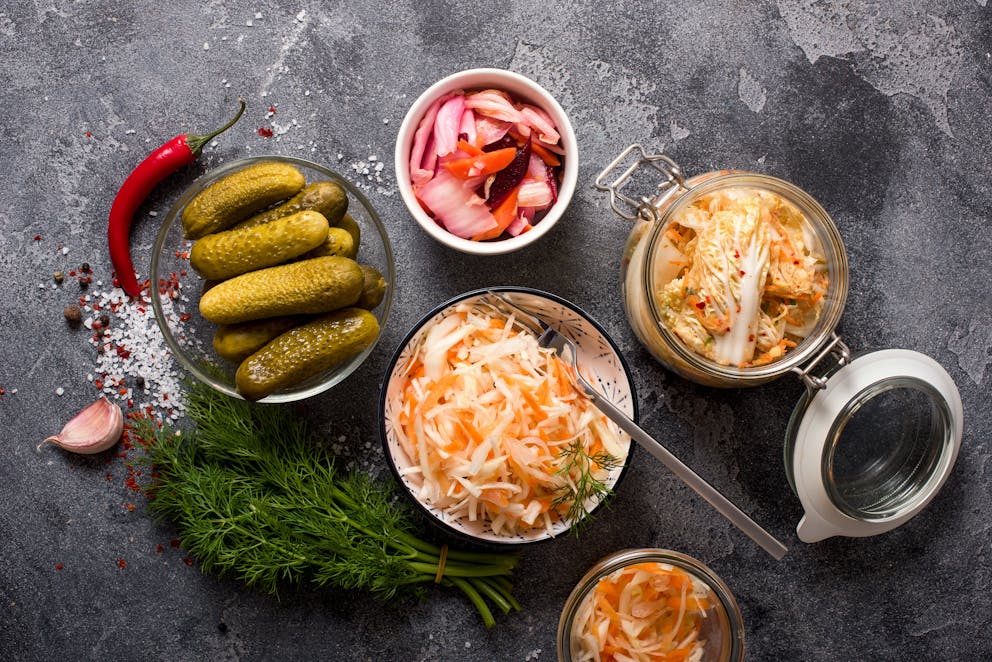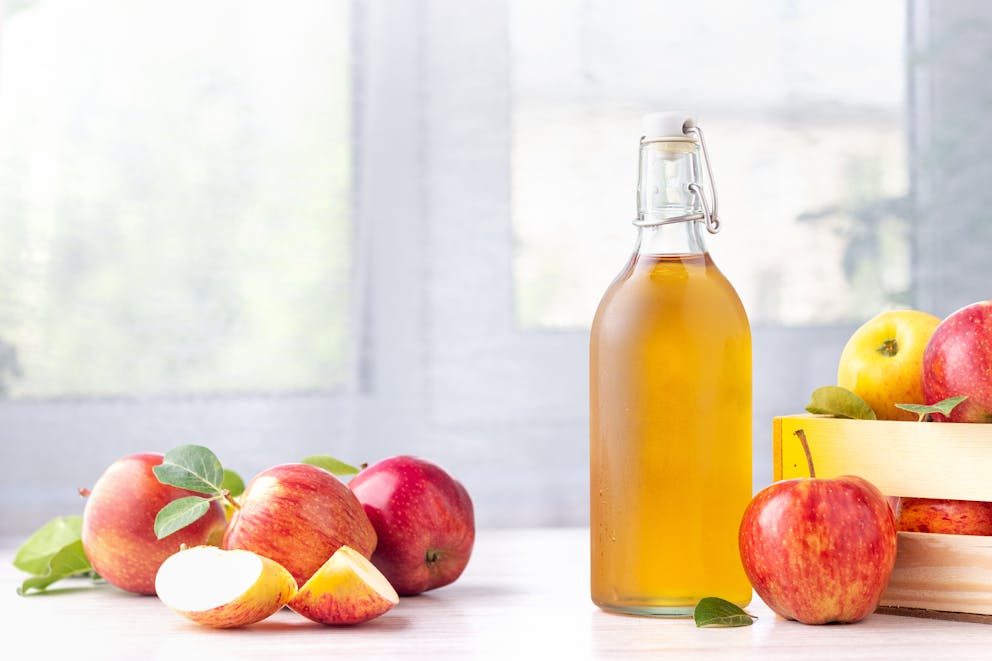Fermented Foods on Keto
Fermented foods have been a culinary staple for millennia due to their multitude of health advantages and their role in preserving food.
Discover the top seven fermented foods you can enjoy on a ketogenic diet and learn how regularly consuming them can improve your digestive health and overall well-being.

What are fermented foods?
Fermentation is a natural process involving the metabolic action of microorganisms, including bacteria and certain yeasts.
During fermentation, these microbes convert sugars and starches into various substances, including alcohol, carbon dioxide, and organic acids.
Fermentation is a form of food preservation fundamental for producing a wide range of foods and beverages, including sourdough bread, fermented vegetables, cheese, yogurt, kombucha, beer, and wine.
Active cultures of microorganisms are usually deliberately introduced to the food source to initiate fermentation processes. However, their growth can also occur spontaneously, depending on the fermentation technique employed.
Microbial fermentation has been utilized to create over five thousand different types of fermented foods worldwide, each with its unique flavor, texture, and nutritional profile.
The bacterial species involved in fermentation processes not only help to preserve foods but also promote a diverse intestinal microflora, making fermented foods an excellent source of health-promoting probiotics.
Due to their vast diversity of probiotic strains, regularly consuming fermented foods can increase microbial gut diversity, which is linked to numerous profound health benefits.
Watch this video to explore which fermented foods you can eat on keto.
Benefits of fermented foods on keto
The substantial health benefits of fermented food are attributed to its abundance of probiotic bacteria, bioactive peptides, and microbial metabolites, which offer several health advantages.
Here are five impressive benefits of fermented foods.
1. Improve digestive health
Fermented foods not only contain probiotics but are also a rich source of enzymes that help to break down food, which supports gut health and improves digestion.
This enhances the absorption of essential nutrients such as vitamins B and K, iron, magnesium, and zinc. These vital nutrients are crucial for many physiological functions, including energy production and neuronal health, while supporting metabolic balance.
In addition, beneficial bacteria in fermented foods play a critical role in promoting a balanced intestinal microflora and can help relieve digestive issues.
Probiotics also enhance gut barrier function and inhibit the growth of potentially harmful bacteria, which is crucial to prevent intestinal inflammation and poor nutrient absorption.
2. Support immune function
The rich diversity of probiotic strains in fermented foods promotes balanced immune responses by stimulating immune cells and enhancing their ability to identify and eliminate harmful pathogens more quickly.
Additionally, certain probiotic peptides in fermented foods have immune-supporting attributes such as anti-carcinogenic, anti-allergenic, and anti-inflammatory properties, according to evidence published in Critical Reviews in Food Science and Nutrition.
3. Nutritional powerhouse
Consuming fermented foods can be a highly nutritious addition to any diet.
A study published in Nutrients observed that fermentation can enhance the nutritional profile of foods by increasing the levels of certain vitamins, including vitamins B2, B12, and K, as well as folate.
These vitamins support energy production, cellular function, DNA synthesis and repair, neurological function, bone health, and blood clotting.

4. Rich in antioxidants
Evidence published in Antioxidants suggests that the fermentation process not only helps to increase the availability of phytochemicals but also fosters the synthesis of antioxidants that may be absent in raw foods.
Dietary antioxidants help promote overall health by mitigating oxidative stress and inflammation, which can play a supportive role in the prevention and management of various chronic diseases.
5. Antifungal properties
According to research published in Infections and Immunity, lactic acid bacteria present in fermented foods, such as sauerkraut, kimchi, and kefir, can inhibit yeast overgrowth.
Specifically, it may effectively inhibit the development of Candida albicans, a common and potentially harmful candida yeast strain that can affect the digestive and reproductive tract.
In addition, a study published in Foods discovered that lactic acid bacteria produce various antifungal metabolites that act as natural preservatives against fungal contamination and mycotoxin production in foods.
These findings demonstrate that certain probiotic strains are a potential natural substitute for synthetic antifungal preservatives and may help protect against fungal infections and food poisoning.

Best fermented foods to have on keto
Many low-carb foods can be fortified by fermentation to enhance their taste, shelf life, and nutritional value. This makes fermented foods an ideal choice for low-carb diets such as keto.
While there are hundreds of fermented foods, here are seven of the top keto-approved options.
1. Sauerkraut
Sauerkraut is a type of fermented cabbage. Lactobacillus bacteria naturally present on cabbage leaves convert sugars into lactic acid, preserving the cabbage and imbuing it with its distinct tangy flavor.
"Out of all the fermented foods, sauerkraut is at the top of the list for its exceptionally high vitamin C content," explains Dr. Berg, "And, what’s more, the lactic acid content of sauerkraut helps to inhibit harmful microbes and enhances the body’s ability to absorb vital minerals."
Sauerkraut is also a rich source of vitamin K2, crucial for directing calcium into the bones and away from soft tissues, thereby supporting bone health and lowering the risk of vascular calcification.
Sauerkraut's many digestive health benefits, along with its low carbohydrate and sugar content, make it an excellent choice for a keto diet.
2. Kimchi
Kimchi, a staple in Korean cuisine, is created by fermenting cabbage with various spices and seasonings such as garlic and chili pepper. This creates a spicy and sour cabbage flavor that can be enjoyed on its own or added as a garnish to a variety of dishes.
Research published in Annals of Nutrition and Metabolism indicated that kimchi consumption may benefit weight management and metabolic health.
Over a four-week period, participants who consumed fresh kimchi experienced reductions in body weight, body mass index, and waist circumference, while displaying improvements in other metabolic health markers.
3. Low-carb fermented vegetables
In general, low-carb fermented vegetables are an excellent choice for individuals following the ketogenic diet.
Most fermented vegetable products are rich sources of lactic acid bacteria and are preserved in a saltwater brine, which enhances their flavor while preserving their crunch.
Fermented vegetables are low in calories and carbohydrates and can be a great source of sodium and potassium, making them an excellent keto-friendly option to help maintain electrolyte balance.

4. Cheese
Cheese is one of the ketogenic diet's mainstays as it's an excellent low-carb source of healthy fats and protein.
Full-fat cheese varieties such as cottage cheese, mozzarella, and cheddar are some of the best choices.
Traditional cheese is made from fermented milk, which undergoes bacterial and enzymatic breakdown of milk proteins, enhancing its flavor and digestibility.
According to research published by Foods and Function, bioactive peptides released during milk fermentation exhibit various beneficial qualities, including blood pressure lowering and antimicrobial effects.
Additionally, cheese provides several essential nutrients, such as vitamin A, B vitamins, and minerals, including calcium and potassium. These nutrients help support vision, skin health, blood pressure regulation, and metabolic balance.
5. Kefir
Kefir is a nutritious fermented dairy product crafted by introducing probiotic kefir grains into milk. These grains are a starter culture that initiates the fermentation of milk with a diverse community of probiotics and yeasts.
As the culture goes to work, it metabolizes lactose, a type of milk sugar, and transforms it into a distinctive, tangy, probiotic-rich, drinkable yogurt.

6. Apple cider vinegar
Raw, unfiltered apple cider vinegar is a particularly valuable addition to a ketogenic diet due to its acetic acid content, which can help regulate blood sugar levels and enhance satiety, supporting metabolism and fat burning.
In addition to the probiotic content of apple cider vinegar, it's also a good source of antioxidants that support immune function and may help reduce cellular damage and inflammation.
7. Olives
Olives are one of the most fermented foods.
In fact, it’s not recommended to eat olives raw as they contain large amounts of oleuropein, a bitter compound that makes them unpalatable and can cause gastrointestinal discomfort.
By fermenting olives in brine, they develop distinct flavors, becoming a versatile ingredient enjoyed in various dishes, including salads, pizzas, and spreads.
Olives are an excellent addition to a keto diet, providing a delicious source of healthy fats, antioxidants, and vitamins E and K.

How to choose keto-friendly fermented foods
It's important to carefully scrutinize nutrition labels before buying fermented foods, as not all options are Healthy Keto® approved.
A few cardinal rules of following a Healthy Keto diet involve selecting high-quality foods that are certified organic and free of genetically modified organisms (GMOs).
This is a critical requirement, especially for fermented products such as tempeh made from fermented soybeans, which are highly susceptible to genetic modification and pesticide contamination.
These harmful chemicals are detrimental to your gut health and can potentially diminish the probiotic content and health benefits of fermented foods.
Unfortunately, many other common fermented foods, such as kombucha, kefir, and miso, are often produced with non-organic and GMO ingredients.
When it comes to fermented dairy products such as cottage cheese and yogurt, most stores only stock low-fat versions. This not only eliminates healthy fats that are essential to maintain ketosis but can mean the use of added sugar to compensate for a loss of texture and flavor.
It’s also recommended to opt for fermented milk products that are unpasteurized or pasteurized at low temperatures, as high heat can destroy many of the beneficial live bacteria present in fermented foods.

Is it safe to eat fermented foods?
Fermented foods are generally recognized as safe and have been consumed for thousands of years across various cultures.
However, it's vital to understand that not all fermented foods are safe to eat, even though fermentation is a naturally occurring process. Just because a food has been fermented doesn't mean it’s edible.
The safety of fermented foods is highly dependent on the conditions and processing methods under which they have been prepared and stored.
That being said, most commercially available fermented foods are safe to eat, as food manufacturers must incorporate meticulous food safety procedures when producing their products.
According to research published in Foods, maintaining proper hygiene during fermentation is crucial to avoiding health risks, particularly in vulnerable populations or those with specific health concerns.
Most people can safely enjoy fermented foods. However, people with bacterial-related chronic conditions such as small intestinal bacterial overgrowth (SIBO) or sensitivities to certain bacterial strains may want to avoid fermented foods to minimize the risk of adverse health effects.
Individuals with health concerns should consult a healthcare provider or dietitian for personalized advice before incorporating fermented foods into their diet.

Key takeaways
In summary, fermented foods are some of the healthiest foods you can eat to help balance your gut microbiome and support overall health.
There are many Healthy Keto-friendly fermented food options to choose from, such as sauerkraut, kimchi, and cottage cheese, all of which offer a vast diversity of probiotics that can help promote digestive health and strengthen the immune system.
To maximize the health benefits of fermented foods, ensure they are organic and non-GMO certified, low in carbohydrates, and don't contain any harmful ingredients or added sugars.
FAQ
1. What are the top fermented foods?
The top fermented foods include sauerkraut, kimchi, low-carb fermented vegetables, cheese, kefir, apple cider vinegar, and olives.
2. What fermented foods are best on keto?
Some of the best fermented foods for keto are cheese, kefir, yogurt, and olives, as they are rich sources of probiotic bacteria and offer healthy fats, which promote ketosis and help to keep your body in fat-burning mode.
In addition, other fermented foods such as sauerkraut, natto, and miso are also excellent sources of probiotics and can complement a ketogenic diet by providing beneficial bacteria and supporting digestive health.
3. What are the benefits of fermented food?
Due to their high probiotic and enzymatic content, fermented foods help support a healthy gut microbiome, aid in the breakdown and absorption of nutrients, and enhance immune system functions.
In addition, fermentation helps preserve food for long periods while improving absorption and synthesis of nutrients.
4. Is sauerkraut keto-friendly?
Yes, sauerkraut is very keto-friendly due to its low carbohydrate content and high levels of lactic acid bacteria, which can aid digestion and support gut health.
5. Can fermented foods help with digestion?
Yes, fermented foods support digestion by introducing beneficial bacteria to the gut microbiome, aiding in nutrient breakdown and absorption, and potentially alleviating digestive discomfort.
Sources
Previous blog
Breath Smells Like AcetoneNext blog
Molybdenum and Its Benefits
Popular
08/31/2023
12.3K views
08/31/2023
15K views
08/31/2023
148.1K views
03/18/2024
11/21/2022




